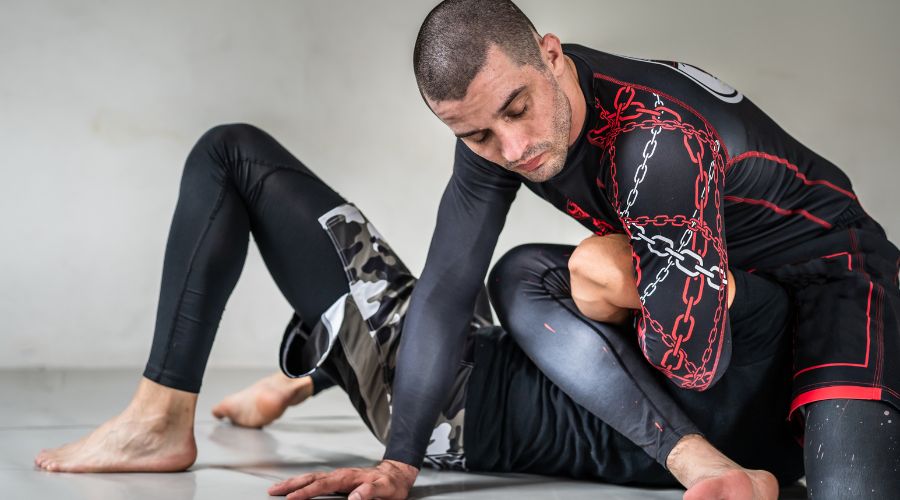BJJ is regarded as one of the most effective self-defense systems, allowing smaller and weaker individuals to defend themselves against larger, stronger attackers. But how much does size matter in a fight, particularly in BJJ?
The more significant the skill gap between the people fighting, the less size matters. The bigger and stronger person has the advantage if both are untrained, but fighting skills can negate most of these advantages. When both have a similar skill set, size becomes an important factor, which is why we have weight divisions in BJJ and combat sports in general.
There is no simple answer as to how much size is an advantage in a fight, so to answer fully, we will look at how much it matters in a fight and then focus more on the full implications of size and strength in BJJ and grappling in general.
Does Size Matter In A Fight
Size matters in a fight, and the bigger person usually has the advantage. This is not an insurmountable obstacle for the smaller fighter or an unbeatable advantage for the larger one, but it does matter. We wouldn’t have weight divisions in all combat sports if it didn’t.
In untrained individuals, size matters greatly, but combat skills equalize a great deal of size disadvantage. But when the skills gap narrows, size and strength start to play a more significant role.
This is why combat sports athletes go through the agony of weight-cutting to have even a small advantage over the opponent.
Hard numbers also back up this common-sense knowledge. Extensive research of 708 MMA fighters and 1392 boxers found that winners regularly gained more weight from the weigh-in to the fight than losers.
According to the data, each percentage increase in body mass results in a 7% rise in the likelihood of success in MMA and a 13% increase in boxing.
This is why weight classes were implemented in the first place- to ensure the winner is decided more by skill rather than pure size. Weight classes make the contest fairer and give everybody type a fair chance.
After all, a 165 cm, 61 kg fighter’s chances of winning against an equally trained 2-meter, 120 kg behemoth is minuscule.
Height and reach have also been pointed out as important advantages, but in truth, they are not. Studies on a fighter’s Ape index (the ratio of a person’s arm span in relation to their height) have found that a bigger Apex index does not correlate to a higher winning percentage in MMA, wrestling, or boxing.
The only time where it does matter is with heavyweight boxing, where the winners tend to have longer arms than usual.
This is not to say that the bigger men always win. There are hundreds of examples of smaller people beating much larger ones in all combat sports arenas and in street fights. Size, strength, and length are but one factor, but it’s meaningful.
Another thing is size matters less the higher you go up in weight. Weight classes in most sports have smaller steps at the lower weights and much larger steps at the heavier divisions.
Open weight tournaments reinforce this, as the heaviest competitors do not win them, but the winner usually is around or north of 100 kg. It’s unlikely that we will see a 61 or 66-kg fighter or grappler win an open-weight tournament any time soon.
How Much Does Size Matter In BJJ

BJJ is regarded as one of the best self-defense systems because it allows smaller people to win against larger, more aggressive attackers. And especially in a gi, this is true. On-the-ground technique and use of leverage and body mechanics turn around huge differences.
But things play out much differently when both parties have the same skills and knowledge, and strength, agility, and endurance become very important. After all, the practice of weight cutting came from the ultra-competitive wrestling world, so it’s only natural that in BJJ, weight differences matter, although not to the same extent.
The cool thing with BJJ is we have weight divisions pitting fighters of the same weight against each other, but we also have an open weight division where all grapplers can participate. And while this is not very healthy when striking is involved, in BJJ, it’s part of every tournament.
Height and length are also part of size, and many people believe they are an advantage, but this is not true. Having longer limbs makes some submissions easier, but it also makes others harder. Shorter, stockier grapplers have to use another toolkit and strategy. So length and height are neither advantages nor disadvantages; it’s all about how you use it.
And while weight is more of a factor, it’s still important to know how to use your size accordingly. For example, lighter fighters often play a more aggressive and dynamic game, using speed, movement, and transitions to create openings and opportunities.
Bulkier ones like to play a more conservative and static game. They use pressure, control, and stability to shut down their opponent’s options and impose their will by wearing down the opponent.
Just like with general fighting skill negates size advantages. A 70 kg black belt will toy with 100 kg white and blue belts, but if both are blue belts, the heavier grappler will have an edge in power, pressure, and sheer weight the smaller guy has to overcome.
Being bigger does not mean winning in BJJ, but it helps.
Do Size And Strength Matter In A Street Fight

With no meaningful skills involved, size becomes a much bigger factor than grit and aggression. A larger person hits harder, can withstand more punishment, and has a huge advantage in grappling. This is why the general population’s belief that the larger person usually wins the fight has a lot of truth to it.
So, the same equation valid for martial artists is also true for street fights. When both fighters are equally unskilled, size matters a lot. The bigger the advantage in skill one party has, the less weight matters.
Famous Small vs. Big Man BJJ Matches
As we’ve seen, bigger grapplers usually win because they have the advantage of weight and strength with a comparable skill set. But people love underdog stories, so it’s always a sight to behold smaller when fighters overcome much larger opponents.
In the ADCC, for example, the lightest winners in the absolute division have come from the 88 kg division, like Claudio Calasans in 2015. Some famous competitors like Marcelo Garcia have succeeded in open weight but have yet to win the gold.
Some upsets have happened under the IBJJF banner, with lightweights winning their division and sweeping the absolute like Jonnatas Gracie did in 2017, but they are few and far between.
Here are some classic David vs. Goliath grappling matches, surprisingly won by the smaller fighter (the compilation has some entertaining moments)
Summary
So, does size matter in a fight? It depends. A size advantage often but not always equals strength advantages; when it does, it’s more important.
But so does technique, tactics, the ability to use your physical attributes to the best ability, grit, determination, and many other factors. The bigger the skill differences are, the less size matters. So, being bigger does not mean you will win, but it sure can help.
